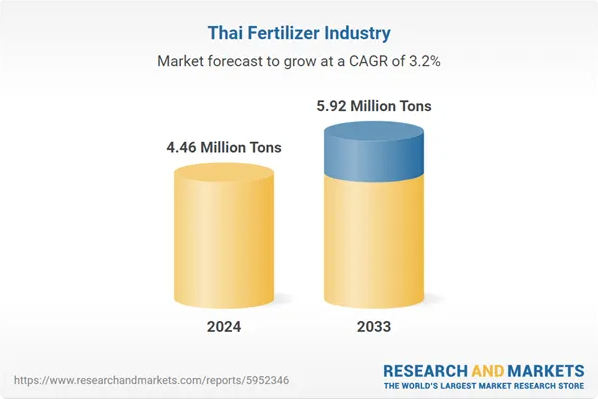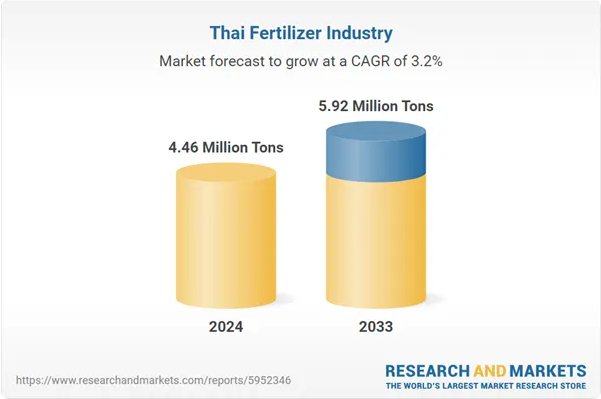
Exhibition time: 17-19 March, 2026 Shanghai, China
 中文
中文

Exhibition time: 17-19 March, 2026 Shanghai, China
 中文
中文
Thai Fertilizer Industry

Dublin, April 17, 2024 (GLOBE NEWSWIRE) -- The "Thailand Fertilizer Industry Research Report 2024-2033" report has been added to ResearchAndMarkets.com's offering.
Agriculture and plantation play a very important role in Thailand's economic development. In the past 20 years, the proportion of Thailand's agricultural economy in GDP has been roughly around 8%-10%, and the total annual output value has exceeded 1.5 trillion baht (US$ 40 billion). Thailand's fertilizer industry has limited production capacity and requires a large amount of imported fertilizers every year. According to the publisher analysis, Thailand is a country with an obvious fertilizer trade deficit. Thailand's annual fertilizer import volume exceeds 4 million tons, but its export volume is only about 500,000 tons. Saudi Arabia, China, Russia, Canada and Malaysia are the top five import sources of fertilizers in Thailand in 2022.

Although the size of Thailand's agricultural land has not changed significantly in recent years, Thailand's agricultural productivity is growing rapidly, and this demand has led to an increase in the adoption of various agricultural products and technologies, promoting the development of Thailand's fertilizer industry.
According to World Bank data, Thailand's cultivated land area in 2021 was approximately 17.15 million hectares, accounting for 32.9% of the total land area. Among them, most of the farms are concentrated in the northeastern region of Thailand. The region suffers from poor soil quality, seasonality, variable rainfall, and scarcity of surface water. According to the publisher analysis, fertilization is crucial to improving agricultural productivity in Thailand.
At the policy level, the Thai government supports farmers by providing agricultural input subsidies. In 2019, the government announced new incentives for Thai farmers in the form of cheap fertilizers. This will promote the application of chemical fertilizers in Thailand. In addition, as the price of fertilizers in Thailand has continued to rise since the beginning of 2022, the Thai government has introduced policies to limit fertilizer prices to maintain the stability of the domestic agricultural economy.
Rice crops dominate Thailand's crops, accounting for 41%, followed by rubber 28%; palm 12%; sugar cane 7%; feed corn 7% and pineapple 5%. These major crops in Thailand are generally fertilized with nitrogen fertilizers., and most soil in Thailand is deficient in nitrogen. Therefore, nitrogen fertilizer is the most commonly used chemical fertilizer in Thailand, especially urea. In 2021, Thailand's urea imports accounted for 73.6% of Thailand's fertilizer imports.
In 2020-2022, COVID -19 had a direct negative impact on the value chain of Thailand Fertilizer market . The main raw materials for the production of fertilizers include ammonium, sulfuric acid, phosphorus and potassium. Logistics obstruction has limited the supply of raw materials, and fertilizer prices have also affected the domestic fertilizer industry during the epidemic. The rise in fertilizer prices has a huge impact on a high-deficit country like Thailand, which basically relies on imports. According to the publisher analysis, Thailand's fertilizer industry has gradually recovered since 2023.
The concentration of chemical fertilizers in Thailand is moderate, and the participants mainly include companies such as Yara (Thailand) Company Limited, Haifa, Chai Thai Co. Ltd, Thai Central Chemical Public Company Limited and Saksiam Group .
The publisher predicts that with the development of Thailand's agriculture and planting industry, Thailand's fertilizer imports will gradually increase in the next few years. The publisher estimates that Thailand's fertilizer imports will be approximately 5.92 million tons in 2033, with a compound annual growth rate of approximately 3.2% from 2024 to 2033.
Source From:Yahoo Finance